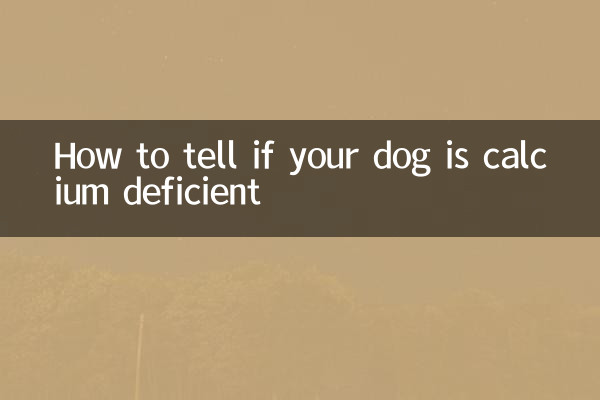How to tell if your dog is calcium deficient
Calcium deficiency in dogs is one of the common problems encountered by pet owners, especially puppies, pregnant or lactating female dogs, and elderly dogs are more likely to suffer from calcium deficiency. Calcium deficiency will not only affect your dog's bone development, but may also lead to muscle twitching, dental problems, and even more serious health risks. This article will combine the hot topics and hot content on the Internet in the past 10 days to provide you with a detailed analysis of the symptoms, causes and coping methods of calcium deficiency in dogs.
1. Common symptoms of calcium deficiency in dogs

When dogs are deficient in calcium, they usually show the following symptoms, and owners need to observe them carefully:
| Symptoms | Specific performance |
|---|---|
| bone problems | Weakness of limbs, deformed joints, and unsteady walking |
| dental abnormalities | Loose teeth, gum recession, and tooth dysplasia |
| muscle twitching | Frequent tremors, convulsions, and even seizures |
| decreased appetite | Decreased interest in food and weight loss |
| Abnormal behavior | Restlessness and frequent body licking |
2. The main causes of calcium deficiency in dogs
There are many reasons for calcium deficiency in dogs. The following are some factors that have been discussed more recently by netizens:
| Reason | Detailed description |
|---|---|
| Unbalanced diet | Feeding a single food for a long time without calcium supplement |
| rapid growth period | Puppies have rapid bone development and a large demand for calcium. |
| Pregnancy or breastfeeding | Female dogs lose a lot of calcium |
| Vitamin D deficiency | Affect calcium absorption |
| disease effects | Kidney disease or endocrine problems causing calcium loss |
3. How to judge whether your dog is calcium deficient
In addition to observing symptoms, owners can also preliminarily determine whether their dog is calcium deficient through the following methods:
1.Palpation examination: Gently press the dog's joints and bones. If the dog shows pain or bone deformation, it may be calcium deficient.
2.behavioral observation: Pay attention to whether your dog licks its joints frequently or has difficulty walking.
3.veterinary diagnosis: Confirm whether calcium levels are normal through blood tests or X-rays.
4. How to prevent and improve calcium deficiency in dogs
To address the problem of calcium deficiency in dogs, owners can take the following measures:
| method | Specific operations |
|---|---|
| Adjust diet | Increase calcium-containing foods (such as bone broth, dairy products) or professional calcium supplements |
| Vitamin D supplement | Get some sun exposure or supplement with cod liver oil |
| Moderate exercise | Promote bone health but avoid excessive exercise |
| Regular physical examination | Comprehensive inspection at least once a year |
| Consult a veterinarian | Use calcium tablets or injections of calcium supplements as recommended by your doctor |
5. Recent hot topics: Misunderstandings about calcium supplementation for dogs
Recently, many netizens have been discussing misunderstandings about calcium supplementation for dogs. Here are a few common mistakes:
1.Blind calcium supplementation: Excessive calcium supplementation may lead to stones or other health problems.
2.Depend on bones for calcium: Cooked bones may puncture the dog’s digestive tract, so it is recommended to choose professional calcium supplements.
3.Ignoring absorption issues: It is necessary to supplement vitamin D while supplementing calcium, otherwise the absorption effect will be poor.
Conclusion
Calcium deficiency in dogs is a health problem that requires attention, and owners should judge and deal with it through scientific methods. If your dog is found to have symptoms of calcium deficiency, it is recommended to consult a veterinarian promptly to develop a reasonable calcium supplement plan. At the same time, regular physical examinations and a balanced diet are key to preventing calcium deficiency.
I hope this article can help you better understand the knowledge about calcium deficiency in dogs, so that your dog can grow up healthily!

check the details

check the details